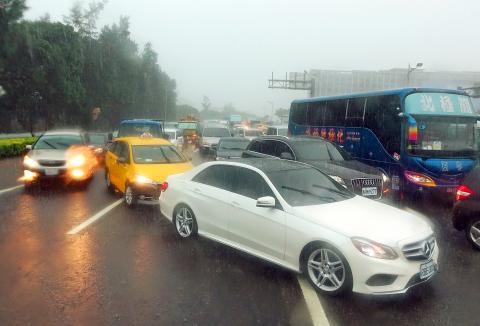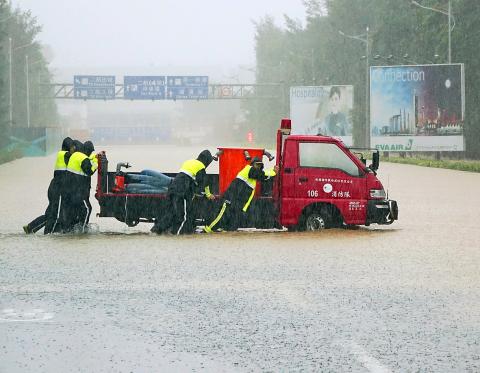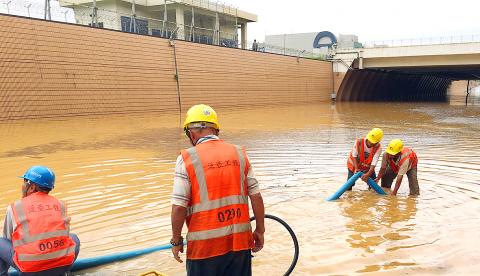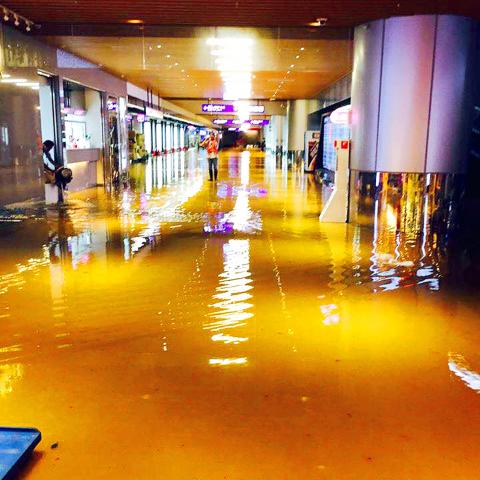Extremely heavy rainfall brought by a frontal system pummeled northern Taiwan yesterday morning, severely disrupting operations at Taiwan Taoyuan International Airport and affecting more than 200 flights.
The Ministry of Transportation and Communications said that the thunderstorms, which lasted for more than two hours, as well as overflow from the Pusin River (埔心溪), had caused flooding at the two traffic underpasses leading to the airport terminals.
Because of the flooding in the underpasses, motorists traveling to and from the airport were asked to use Provincial Highway No. 4, rather than the usual route, Freeway No. 2.

Photo: Chu Pei-hsiung, Taipei Times
Rainwater also leaked through the ceiling of Terminal Two and caused flooding in its underground food court.
Air navigation facilities on Datunshan (大屯山), in Taipei’s Beitou District (北投), which are used to guide air traffic into the airport, were also affected by the thunderstorms, forcing Air Navigation and Weather Services to activate a backup system in order to continue with air traffic control procedures.
By 1:30pm, 88 flights arriving at the airport and 131 departure flights had been affected by the weather, including two flights that were forced to land at airports in Kaohsiung and Taichung.

Photo: Chu Pei-hsiung, Taipei Times
After pumping out the floodwater, the airport reopened its main access routes at 6:13pm.
Passengers were crowded in the lobby of Terminal Two last night due to a backlog of delayed flights and an incomplete resumption of the power supply inside the terminal.
In response to the worst flooding since the airport opened in 1979, Premier Lin Chuan (林全) ordered the ministry to identify the causes of the flooding, adding that it must also identify those who should be held accountable.

Photo: CNA
“Lin was upset, because the airport is the gateway of the nation, and the flood caused a lot of trouble to the public,” Executive Yuan spokesman Tung Chen-yuan (童振源) said. “The premier said that apparently there are serious problems with the construction [of the third terminal] at the airport, and asked the ministry to investigate — if there are human factors involved, then those people should be held responsible as well,” Tung said.
Deputy Minister of Transportation and Communications Wang Kwo-tsai (王國材) said that the ministry would deal with the issue of overflow from the Pusin River with assistance from the Water Resources Agency and the Taoyuan City Government.
He said that Taoyuan International Airport Corp (TIAC) needs to reinforce its ability to handle flooding at the airport, including the use of water pumps and power generators.

Photo: CNA, screengrab from Facebook
“TIAC must learn to coordinate with the Taoyuan City Government and its police department to facilitate access to the airport when flooding occurs,” Wang said.
The Taoyuan City Government dismissed claims from TIAC that the overflow from the Pusin River had clogged the airport’s drainage system with trash and tree branches.
However, Wang said that now is not the time to be looking for someone to blame.
“The most important thing is to solve the problem,” he said.
Wang said that 153mm of rain had poured into Taoyuan within three hours yesterday morning.
The Central Weather Bureau said that rainfall in Taoyuan yesterday morning accounted for about 8 percent of the city’s average annual rainfall, which is about 1,930mm.
The bureau said that the heavy rain was caused by a convection system, which moved slowly and caused heavy rainfall between 9:30am and 11:30am.
Additional Reporting by Loa Ioksin

PREPAREDNESS: Given the difficulty of importing ammunition during wartime, the Ministry of National Defense said it would prioritize ‘coproduction’ partnerships A newly formed unit of the Marine Corps tasked with land-based security operations has recently replaced its aging, domestically produced rifles with more advanced, US-made M4A1 rifles, a source said yesterday. The unnamed source familiar with the matter said the First Security Battalion of the Marine Corps’ Air Defense and Base Guard Group has replaced its older T65K2 rifles, which have been in service since the late 1980s, with the newly received M4A1s. The source did not say exactly when the upgrade took place or how many M4A1s were issued to the battalion. The confirmation came after Chinese-language media reported

A Ministry of Foreign Affairs official yesterday said that a delegation that visited China for an APEC meeting did not receive any kind of treatment that downgraded Taiwan’s sovereignty. Department of International Organizations Director-General Jonathan Sun (孫儉元) said that he and a group of ministry officials visited Shenzhen, China, to attend the APEC Informal Senior Officials’ Meeting last month. The trip went “smoothly and safely” for all Taiwanese delegates, as the Chinese side arranged the trip in accordance with long-standing practices, Sun said at the ministry’s weekly briefing. The Taiwanese group did not encounter any political suppression, he said. Sun made the remarks when

The Taiwanese passport ranked 33rd in a global listing of passports by convenience this month, rising three places from last month’s ranking, but matching its position in January last year. The Henley Passport Index, an international ranking of passports by the number of designations its holder can travel to without a visa, showed that the Taiwan passport enables holders to travel to 139 countries and territories without a visa. Singapore’s passport was ranked the most powerful with visa-free access to 192 destinations out of 227, according to the index published on Tuesday by UK-based migration investment consultancy firm Henley and Partners. Japan’s and

BROAD AGREEMENT: The two are nearing a trade deal to reduce Taiwan’s tariff to 15% and a commitment for TSMC to build five more fabs, a ‘New York Times’ report said Taiwan and the US have reached a broad consensus on a trade deal, the Executive Yuan’s Office of Trade Negotiations said yesterday, after a report said that Washington is set to reduce Taiwan’s tariff rate to 15 percent. The New York Times on Monday reported that the two nations are nearing a trade deal to reduce Taiwan’s tariff rate to 15 percent and commit Taiwan Semiconductor Manufacturing Co (TSMC, 台積電) to building at least five more facilities in the US. “The agreement, which has been under negotiation for months, is being legally scrubbed and could be announced this month,” the paper said,